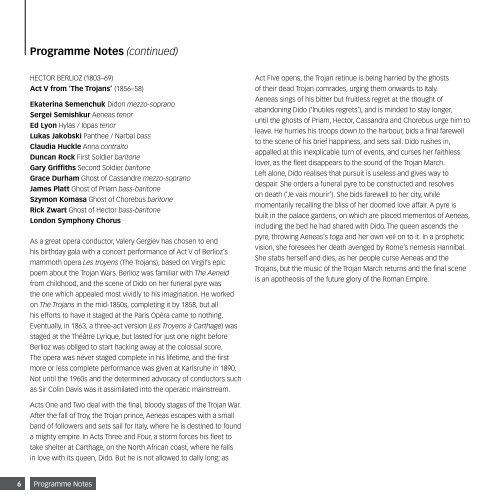Wednesday 22 May: Concert Programme - London Symphony ...
Wednesday 22 May: Concert Programme - London Symphony ...
Wednesday 22 May: Concert Programme - London Symphony ...
You also want an ePaper? Increase the reach of your titles
YUMPU automatically turns print PDFs into web optimized ePapers that Google loves.
<strong>Programme</strong> Notes (continued)<br />
HectoR Berlioz (1803–69)<br />
Act V from ‘The Trojans’ (1856–58)<br />
Ekaterina Semenchuk Didon mezzo-soprano<br />
Sergei Semishkur Aeneas tenor<br />
Ed Lyon Hylas / Iopas tenor<br />
Lukas Jakobski Panthee / Narbal bass<br />
Claudia Huckle Anna contralto<br />
Duncan Rock First Soldier baritone<br />
Gary Griffiths Second Soldier baritone<br />
Grace Durham Ghost of Cassandre mezzo-soprano<br />
James Platt Ghost of Priam bass-baritone<br />
Szymon Komasa Ghost of Chorebus baritone<br />
Rick Zwart Ghost of Hector bass-baritone<br />
<strong>London</strong> <strong>Symphony</strong> Chorus<br />
As a great opera conductor, Valery Gergiev has chosen to end<br />
his birthday gala with a concert performance of Act V of Berlioz’s<br />
mammoth opera Les troyens (The Trojans), based on Virgil’s epic<br />
poem about the Trojan Wars. Berlioz was familiar with The Aeneid<br />
from childhood, and the scene of Dido on her funeral pyre was<br />
the one which appealed most vividly to his imagination. He worked<br />
on The Trojans in the mid-1850s, completing it by 1858, but all<br />
his efforts to have it staged at the Paris Opéra came to nothing.<br />
Eventually, in 1863, a three-act version (Les Troyens à Carthage) was<br />
staged at the Théâtre Lyrique, but lasted for just one night before<br />
Berlioz was obliged to start hacking away at the colossal score.<br />
The opera was never staged complete in his lifetime, and the first<br />
more or less complete performance was given at Karlsruhe in 1890.<br />
Not until the 1960s and the determined advocacy of conductors such<br />
as Sir Colin Davis was it assimilated into the operatic mainstream.<br />
Act Five opens, the Trojan retinue is being harried by the ghosts<br />
of their dead Trojan comrades, urging them onwards to Italy.<br />
Aeneas sings of his bitter but fruitless regret at the thought of<br />
abandoning Dido (‘Inutiles regrets’), and is minded to stay longer,<br />
until the ghosts of Priam, Hector, Cassandra and Chorebus urge him to<br />
leave. He hurries his troops down to the harbour, bids a final farewell<br />
to the scene of his brief happiness, and sets sail. Dido rushes in,<br />
appalled at this inexplicable turn of events, and curses her faithless<br />
lover, as the fleet disappears to the sound of the Trojan March.<br />
Left alone, Dido realises that pursuit is useless and gives way to<br />
despair. She orders a funeral pyre to be constructed and resolves<br />
on death (‘Je vais mourir’). She bids farewell to her city, while<br />
momentarily recalling the bliss of her doomed love affair. A pyre is<br />
built in the palace gardens, on which are placed mementos of Aeneas,<br />
including the bed he had shared with Dido. The queen ascends the<br />
pyre, throwing Aeneas’s toga and her own veil on to it. In a prophetic<br />
vision, she foresees her death avenged by Rome’s nemesis Hannibal.<br />
She stabs herself and dies, as her people curse Aeneas and the<br />
Trojans, but the music of the Trojan March returns and the final scene<br />
is an apotheosis of the future glory of the Roman Empire.<br />
Acts One and Two deal with the final, bloody stages of the Trojan War.<br />
After the fall of Troy, the Trojan prince, Aeneas escapes with a small<br />
band of followers and sets sail for Italy, where he is destined to found<br />
a mighty empire. In Acts Three and Four, a storm forces his fleet to<br />
take shelter at Carthage, on the North African coast, where he falls<br />
in love with its queen, Dido. But he is not allowed to dally long; as<br />
6 <strong>Programme</strong> Notes
















